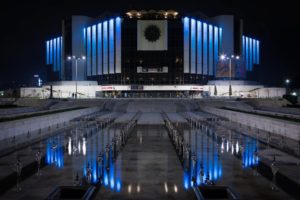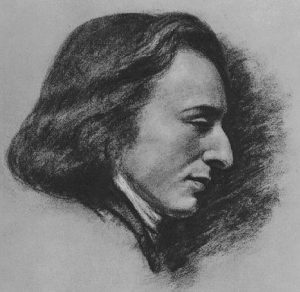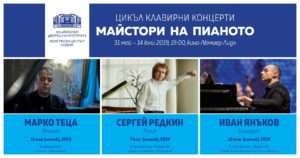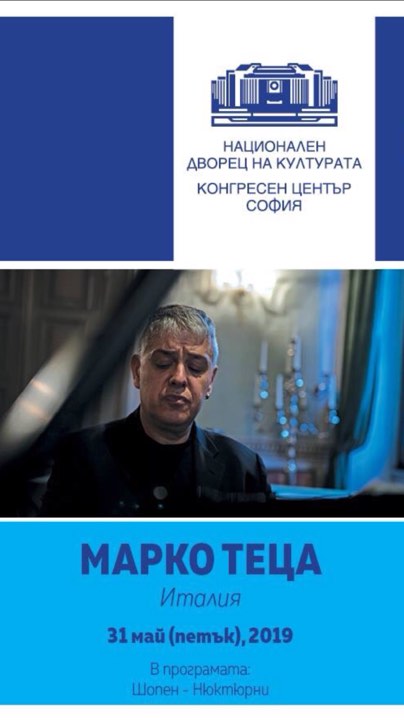Sofia – Piano Masters
Marco Tezza for the Piano Master Series at the Palace of Culture in Sofia – 31st May – Sofia (Bulgaria)
СПЕЦИАЛЕН ГОСТ
Пианистът Марко Теца: Чест и удоволствие е да се връщам в България
На 31 май Марко ще изнесе концерт в кино “Люмиер Лидл”, част от цикъла клавирни концерти “Майстори на пианото”
Exclusive interview for Dir.bg. (by Nikoleta Nikolova)
What links you to Bulgaria?
Bulgaria is almost an adopted country for me. When I was young I met the pianist and teacher Antonina Boneva and started a strong bond with the most important musical family in this country. I recorded my first LP for Balkaton in the Bulgaria Hall, many years ago. My teacher as Orchestra Director Ludmil Desoevera was one of the main Directors of Opera and Ballet in Sofia, I got my Diploma with him. Then I got in touch with big musicians in Bulgaria, the pianist Ivn Drenikov and the singer Alexandrina Pendatchanska. I was invited in Sofia and other towns to give concerts and masterclass (Sofia Conservatory and NBU), I recently worked for FM Orchestra and also recorded a live album in Bulgaria Hall. For me it’s always a great honor and a great joy to come back to Sofia!

Why did you choose Chopin’s Nocturnes for your recital program in Sofia?
I ‘ll record Chopin’s Nocturnes this year and I’m playing this program in many recitals in this season 2018-19, I’m tryng to link energy with emotions in the right equipoise before turning up the microphone. I believe Nocturnes, together with Preludes and most of Polonnaises- even though not so much- are the real Chopin’s intimate diary. He dares sharing with us his private emotions, showing the deep desperation associated with his short life. The Nocturnes go along all his adult period, from 19 to 36 years old, years full of grief: being an exile, away from his family and country, always surrounded by the wars and bloody revolutions occurring in Poland. Loves and romances only dreamt, never happy ending. Bad health all along his life, diseases till death. Only if we read these materpieces in the light of these facts, that makes sense to approach them after two hundred years of listening and awareness.
How much of your professional engagement takes the conducting, teaching and your performances as a concert pianist?
After finishing my studies (piano- violin- orchestra conductor) and after successes at important competitions, I started 2 careers (pianist and conductor). I created an Orchestra- the Stravinskij Chamber Orchestra, with which I conducted hundreds of concerts, often both as pianist and conductor. This activity is now over, but I still go on with the direction with many orchestras in Italy, Bulgaria, Korea, Usa, Poland, Germany, Turkey etc. As a pianist I work a lot, but it is difficult to give a percentage of the activity, also my engagement as a teacher is continuous. I think the relationship with young students is wonderful and invaluable: all that one learns from teaching is essential. That’s why I spend lot of time with my students at the Conservatory in Vicenza and in masterclasses around the world.

In what way the audience is changed today and the task of the musicians to communicate adequately with her?
I think all the people who work in cultural fields should ask themselves which way we are walking these days. I’m lucky because I travel a lot and so have the opportunity of seeing a lot of new ideas to attract the audience towards classical music. We cannot accomplish this result in the same ways in use 50 years ago. I see the job is starting from children, who are supposed to become the future audience- otherwise we risk empty halls. Nowadays we should give capturing programs, so that the persons do not get afraid of listening to one of Mahler’s symphonies: for example we should explain that for the movie track of Star Wars J.Williams was inspired by Mahler-Respighi-Strauss. Things like that.
Also the artists should understand that today one cannot listen to the great repertory as it was used in past centuries. The artists should practice new ideas in order to enchant the audience with a new breath into the old well- known music. Listeners may disagree with the interpretation, but they participate anyway, they reflect.

What will be your message to the Bulgarian public with your forthcoming concert?
I can promise a very personal interpretation of Chopin’s Nocturnes. It’s my habit to read music looking for what is uncommon, hidden, unconventional. It’s not a stance, rather a necessity. I need to dig into the music, this is necessary as oxygen for breathing; I study for years before presenting a new program. So I go against the tide, against the career pattern that says “everything fast and now”. I struggle all the time to save my time, the sacred time I humbly need for Music, before I feel ready to offer the program to the audience.
So, sure, raise your antennas up for this Chopin!

